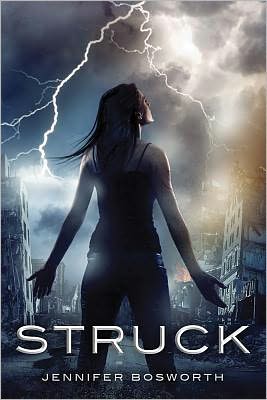It never ceases to amaze me what lengths writers will go to in order to set up their perfect post-apocalyptic dystopias. Take, for instance, Struck. Set a month after an 8.6 earthquake utterly devastates the heart of Los Angeles, it features Mia Price, a young woman with an uncanny, superhuman affinity for lightning, who’s been struck numerous times and always recovered afterwards. As she wanders the ruined streets of Los Angeles, she’s drawn up into a struggle between two different factions who both believe she’s the key to preventing or kick starting the final apocalypse.
When you look at Struck from that sort of distance, things seem to work. After all, Los Angeles is pretty much ripe for an earthquake, and we’re all just waiting for California to fall into the ocean any day now, right? The problem is, this book asks us to accept a lot of little details that don’t quite add up. The first of which is the way things get to be so bad in the first place .
In the back story, it’s explained that the world is generally suffering a whole bunch of smaller catastrophes all at once. Droughts and wildfires in the Midwest. Unseasonal hurricanes in the Gulf of Mexico. Tornados where there shouldn’t be any. Wars, famine, and pandemics. And in the middle of all this, a lightning storm strikes Los Angeles, somehow triggering the Puente Hills Fault Line and thus kicking off the fateful earthquake. A month later, and those who remain in the area are short on supplies and hope, many suffering from “earthquake fever,” an “immunity disorder caused by mold released by the quake.” So yeah, sounds like everything’s set up for some real end of days action with law and order a thing of the past for the city.
As things get worse, Mia is courted by two different factions. The white-clad Followers of Rance Ridley Prophet have bought into the televangelist’s old school, fire-and-brimstone extremist method of saving souls. The black-clad Seekers believe it’s their duty to save the world from the false prophet. Both think Mia, with her ability to attract and survive lightning strikes, with her numerous lightning-inflicted scars, with her psychic visions and excess body heat, is somehow crucial to either saving or destroying the world. They’ll both do whatever it takes to win her over to their side.
There’s a decent story buried here. Unfortunately, it’s lost in the morass of unlikable characters—neither the Followers nor the Seekers come off as particularly sympathetic or trustworthy—and half-religious, half-New Age imagery. Mia wanders through the wasteland, both figuratively and literally, as the author mixes in elements from T.S. Eliot and the Tarot. She falls for Jeremy, a mysterious young man whose touch inspires bizarre visions, who alternates between courting, betraying, and trying to kill her. (His first appearance is in her room. At night. With a knife. But he’s not stalkery at all! Really!) And um stuff happens.
I’ll be honest. I really wanted to like this book, because it had a fascinating premise and an interesting set-up. Unfortunately, I wasn’t all that impressed by the actual execution. There are too many elements at play here, from the extensive disasters that create the current apocalyptic setting, to the evil religious cult, to the ill-defined lightning-derived abilities, and it all feels unbalanced. It’s a setting where kids go to school for rations, where core classes are supported but electives are cancelled, where people go to raves in the worst-hit parts of the city, where the U.S. government is supposedly too busy in every other part of the world that they can’t even focus on a major city like Los Angeles.
I can see some of what Bosworth was attempting to do here, and it’s a good attempt at creating a hellish yet dreamlike setting where people are forced to make hard choices, but it lacked a certain resonance. Many of the characters fail to leave an impression, others make the wrong sort of impression. Mia makes for a strong, if somewhat conflicted, point of view, but she has almost no chemistry with Jeremy, her supposed love interest, and he in turn is more of a cipher than a fully-formed character for much of the book. The other characters tend to fall into roles such as Evil Cult Leader, Rebellious Brother, Mysterious Other Cult Leader, and Traumatized Mother.
Again, this is the sort of book that has a lot of potential, but things went awry somewhere down the line, and the core message was lost amidst the various trappings. I didn’t dislike Struck, but it didn’t exactly light me on fire.
Michael M. Jones is a writer, editor, and book reviewer. He lives in Roanoke, VA, with a pride of cats, way too many books, and a wife who occasionally steals whatever he’s reading. For more information, visit him and an ever-growing archive of reviews at Schrodinger’s Bookshelf. He is the editor of the forthcoming anthology, Scheherazade’s Facade.










